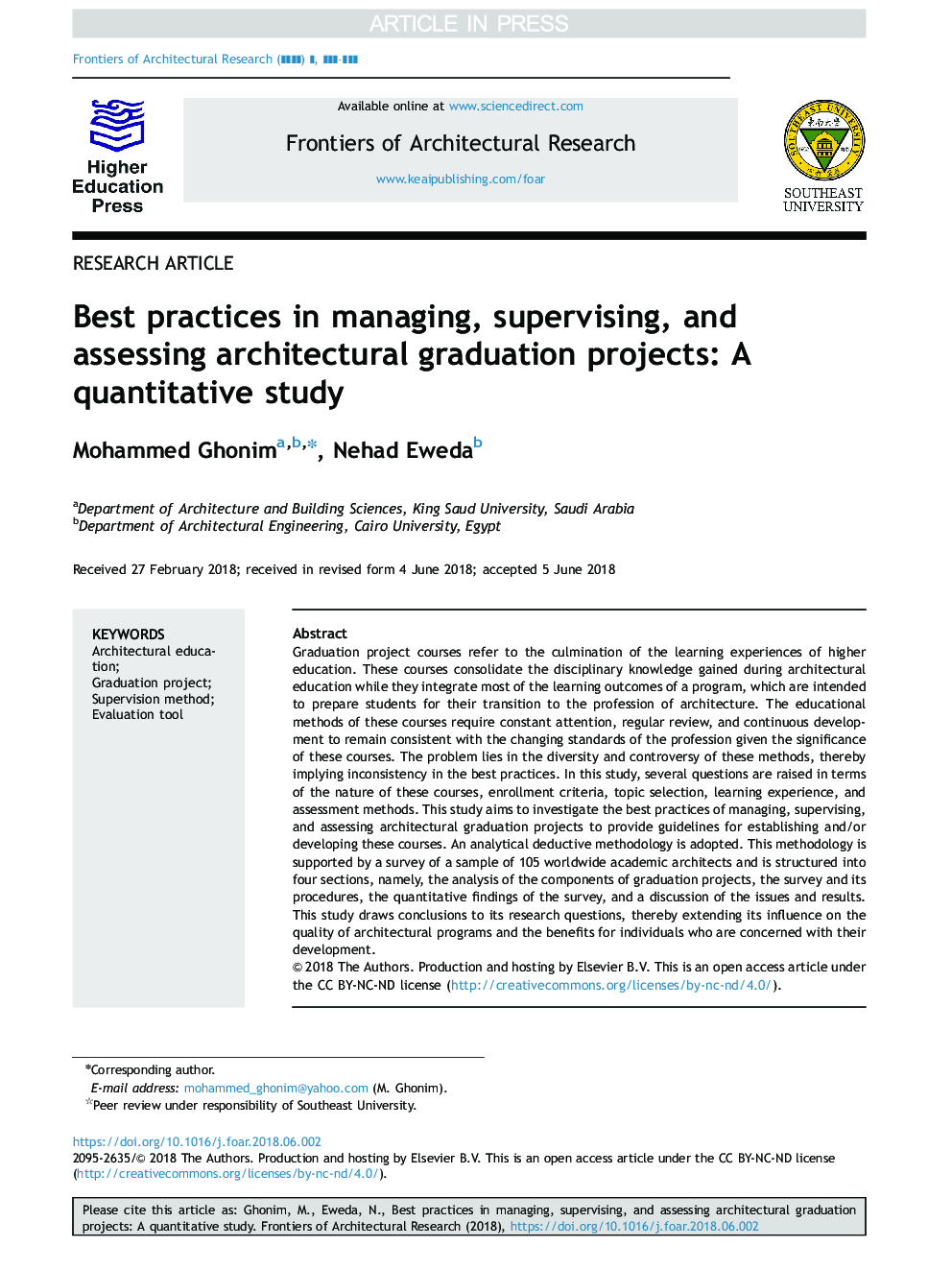| کد مقاله | کد نشریه | سال انتشار | مقاله انگلیسی | نسخه تمام متن |
|---|---|---|---|---|
| 11021302 | 1714582 | 2018 | 16 صفحه PDF | دانلود رایگان |
عنوان انگلیسی مقاله ISI
Best practices in managing, supervising, and assessing architectural graduation projects: A quantitative study
ترجمه فارسی عنوان
بهترین شیوه های مدیریت، نظارت و ارزیابی پروژه های فارغ التحصیل معماری: یک مطالعه کمی
دانلود مقاله + سفارش ترجمه
دانلود مقاله ISI انگلیسی
رایگان برای ایرانیان
کلمات کلیدی
آموزش معماری، پروژه ی فارغ التحصیلی، روش نظارت، ابزار ارزیابی،
ترجمه چکیده
دوره های آموزشی فارغ التحصیلی به دوره یادگیری تجارب تحصیلی بالاتر می روند. این دوره ها دانش دانش انضباطی را که در طول تحصیلات معماری به دست آورده اند، تقویت می کنند در حالی که بسیاری از نتایج یادگیری یک برنامه را در نظر می گیرند که هدف آن آماده سازی دانش آموزان برای گذار به حرفه معماری است. روش های آموزشی این دوره ها مستلزم توجه دائمی، بازبینی منظم و توسعه مداوم است تا با استانداردهای در حال تغییر حرفه ای با توجه به اهمیت این دوره ها مطابقت داشته باشد. مشکل این است که تنوع و اختلاف نظر در مورد این روش ها، به این معنی ناسازگاری در بهترین شیوه ها است. در این مطالعه، از نظر ماهیت این دوره ها، معیارهای ثبت نام، انتخاب موضوع، تجربه یادگیری، و روش های ارزیابی، چندین سوال مطرح شده است. این مطالعه با هدف بررسی بهترین شیوه های مدیریت، نظارت و ارزیابی پروژه های فارغ التحصیل معماری جهت ارائه راهکارهایی برای ایجاد و / یا توسعه این دوره ها است. یک روش تحلیلی کشف پذیرفته شده است. این روش با بررسی یک نمونه از 105 معمار دانشگاهی در سراسر جهان پشتیبانی می شود و به چهار بخش تقسیم شده است: تجزیه و تحلیل اجزای پروژه های فارغ التحصیلی، نظرسنجی و رویه های آن، یافته های کمی از نظرسنجی و بحث در مورد مسائل و نتایج. این مطالعه نتیجه گیری های خود را به سوالات تحقیق، به طوری که گسترش نفوذ خود را بر کیفیت برنامه های معماری و منافع افرادی که در توسعه خود نگران هستند.
موضوعات مرتبط
مهندسی و علوم پایه
مهندسی انرژی
انرژی های تجدید پذیر، توسعه پایدار و محیط زیست
چکیده انگلیسی
Graduation project courses refer to the culmination of the learning experiences of higher education. These courses consolidate the disciplinary knowledge gained during architectural education while they integrate most of the learning outcomes of a program, which are intended to prepare students for their transition to the profession of architecture. The educational methods of these courses require constant attention, regular review, and continuous development to remain consistent with the changing standards of the profession given the significance of these courses. The problem lies in the diversity and controversy of these methods, thereby implying inconsistency in the best practices. In this study, several questions are raised in terms of the nature of these courses, enrollment criteria, topic selection, learning experience, and assessment methods. This study aims to investigate the best practices of managing, supervising, and assessing architectural graduation projects to provide guidelines for establishing and/or developing these courses. An analytical deductive methodology is adopted. This methodology is supported by a survey of a sample of 105 worldwide academic architects and is structured into four sections, namely, the analysis of the components of graduation projects, the survey and its procedures, the quantitative findings of the survey, and a discussion of the issues and results. This study draws conclusions to its research questions, thereby extending its influence on the quality of architectural programs and the benefits for individuals who are concerned with their development.
ناشر
Database: Elsevier - ScienceDirect (ساینس دایرکت)
Journal: Frontiers of Architectural Research - Volume 7, Issue 3, September 2018, Pages 424-439
Journal: Frontiers of Architectural Research - Volume 7, Issue 3, September 2018, Pages 424-439
نویسندگان
Mohammed Ghonim, Nehad Eweda,
